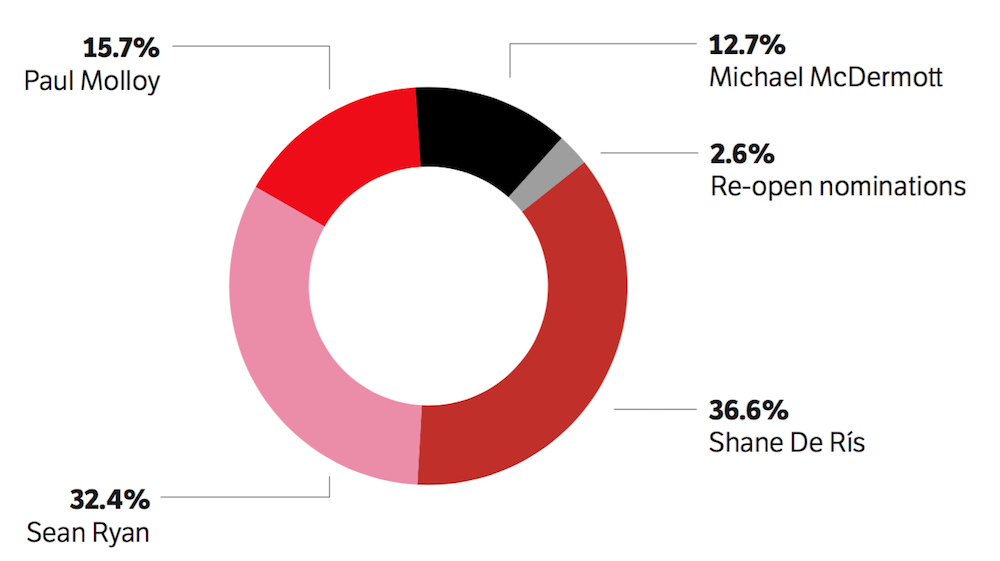Our polls predict that either Shane De Rís or Sean Ryan will be elected President of Trinity College Dublin Students’ Union (TCDSU) in this year’s elections. A three-day in-person poll of 1,060 students, conducted by The University Times at locations both on and off-campus, predicts that the race for president will only be decided on the fourth and final count.
President
The polls reveal that with De Rís on 36.6 per cent of first preferences and Ryan with 32.4 per cent, the race is too close to call and that just over one per cent of the vote will separate De Rís and Ryan after their opponents’ votes have been reallocated. Both are well ahead of nearest rivals Paul Molloy and Michael McDermott. Paul Molloy is set to get 15.7 per cent of first preferences, while Michael McDermott is likely to collect just 12.7 per cent.
When the two other candidates are eliminated, our poll predicts De Rís and Ryan will finish the race with 46.7 per cent and 45.3 per cent of the vote respectively, leaving De Rís the next TCDSU President. However, with our margin of error at 2.78 per cent, the race is too close to call.
McDermott will be eliminated in the second round, with De Rís being allocated the majority of his votes. Molloy will be eliminated by the third round, with the majority of his transfers set to go to Ryan. Approximately 27 per cent of those polled had yet to decide how they would vote in the presidential race.
Over the course of last week, no candidate had emerged as the favourite, even if Ryan’s on-the-ground presence had been by far the largest – backed by a large campaign team gaining him the popular vote. McDermott, who emerged first as a joke candidate, has jumped quickly from online satire to a serious voice in a muted race. The results of our poll suggest that this year’s presidential race could be the closest in years.
Close call in the fourth and final count
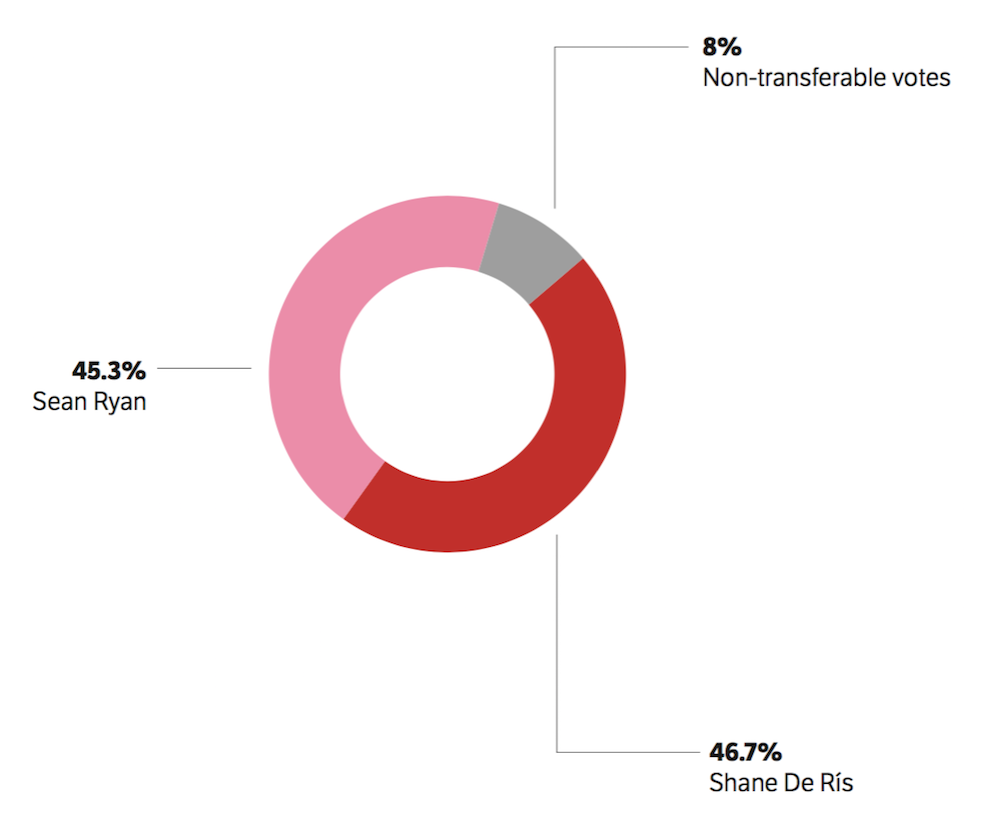
However, De Rís has substantial union knowledge and is seen as the experienced candidate. A large cohort of current third years would know De Rís from his time as their JCR president, and though doing the best out of all the candidates with 38.8 per cent of the third-year students, he could have been expected to do better. Next up is rival Ryan, with just 27.1 per cent of votes from third years likely to head his way.
The analysis of the faculty breakdown shows Ryan taking a slight lead over De Rís in the Faculty of Arts, Humanities and Social Sciences (AHSS) with 37.3 per cent to 33.7 per cent respectively. Ryan is a fourth-year law student, which can offer some explanation of why he’s performing very well with both AHSS and fourth years. According to our poll, Ryan is relying heavily on the fourth-year vote, where he is likely to get 53.4 per cent, with De Rís set to receive less than half of what Ryan is expecting, with just 20.9 per cent.
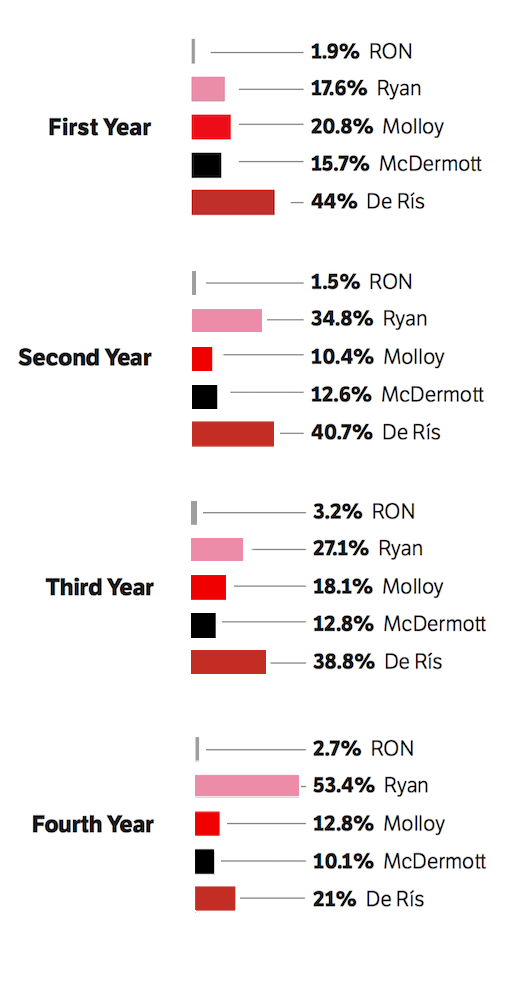
However, De Rís is taking more than double the votes compared to Ryan from health science students. De Rís is likely to receive 54.8 per cent of this group, with Ryan just taking 27.4 per cent.
Among first years, De Rís is performing the best, getting 44 per cent of the poll, with Molloy next best, receiving 20.8 per cent. De Rís campaigned and won the position of JCR President two years ago, so his wealth of knowledge and ability to campaign to first years is potentially a winning strategy.
Ryan’s second highest vote is 34.8 per cent from second-year students, with De Rís likely to collect 40.7 per cent.
De Rís’s decision to hit the ground hard in Trinity Hall last Monday night clearly has swung first years in his favour. Despite Ryan being the only other presidential candidate to make a trip out to Dartry, it has not shown in the polls – where he got just 17.6 per cent amongst first years.
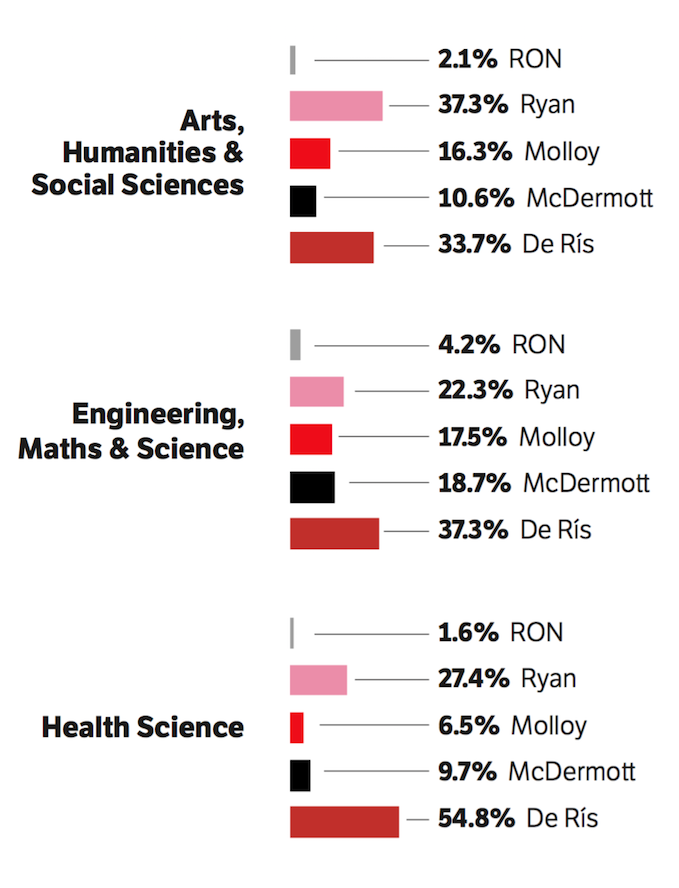
De Rís is performing more consistently across the three faculties than Ryan, and he performs well over first, second and third year. Whereas Ryan is not very consistent across faculties, his big get in the poll comes from fourth-year students. Being a fourth-year law student with a large, dedicated campaign team will be crucial in the race against De Rís.
Considering both candidates performances at hustings last week, it is not surprising to see them neck-and-neck. Neither managed to truly separate themselves from the bunch – something that Molloy didn’t manage either.
Education
Aimee Connolly, a fourth-year BESS student running uncontested, looks set to be elected TCDSU Education Officer. Our poll predicts she will receive 87.4 per cent of first preferences. Connolly, who ran a campaign based on incremental reforms to the education officer role and largely ignored the looming Trinity Education Project, will seemingly pick up 12.6 re-open nominations, which is 0.5 percentage points above incumbent Alice MacPherson.
Aimee Connolly Takes on RON

Education, a perennially uncontested race, is one that students often fail to fully engage with. This year is no different, with 36.4 per cent of voters saying they were unsure if they would choose re-open nominations or Connolly.
Connolly made it her mission to visit Trinity Hall early last week, which perhaps explains her high polling, at 93.2 per cent, among first years. Support for Connolly, however, is at its lowest among third-year students, with 18.9 per cent of people surveyed choosing re-open nominations. Among her own year, Connolly, who is the Chair of DU Amnesty and is the TCDSU BESS Convenor, does remarkably well, receiving 91.7 per cent of their votes.
While Connolly has been assured at hustings, despite placing little emphasis on the Trinity Education Project, she also lacks overwhelming support from students within her own faculty. While she enjoyed 86.9 per cent of the votes from students in the AHSS faculty, she received over 13 per cent of re-open nominations from her fellow faculty members – the highest of any faculty in any race.
In contrast to MacPherson, who made the issue of women in leadership central to her manifesto, Connolly declined to mention the issue in her manifesto, despite being only one of two women running in this year’s elections.
Connolly’s polling among EMS students, as well as health science students, is instructive. Her support among the latter group of students is less than MacPherson last year, who polled 93 per cent among those voters. Indeed, every other faculty except her own seems less willing to vote re-open nominations. Among EMS students, Connolly polled 87.6 per cent, suggesting she did well to convince students possibly concerned about the impact of the Trinity Education Project.
While Connolly might not have included the project prominently in her election campaign material, students don’t seem to have minded. MacPherson’s slightly better polling last year might have been a result of stronger hustings performances, but Connolly’s approach to the Trinity Education Project doesn’t seem to have cost her votes.
Welfare
James Cunningham, the sole candidate in the welfare race, looks set to be elected in the first round with 89.2 per cent of first-preference votes. Cunningham, a third-year philosophy, politics, economics and sociology student, will likely receive a 10.8 per cent vote to re-open nominations – the lowest of uncontested races this year.
No Fear of RON for Cunningham
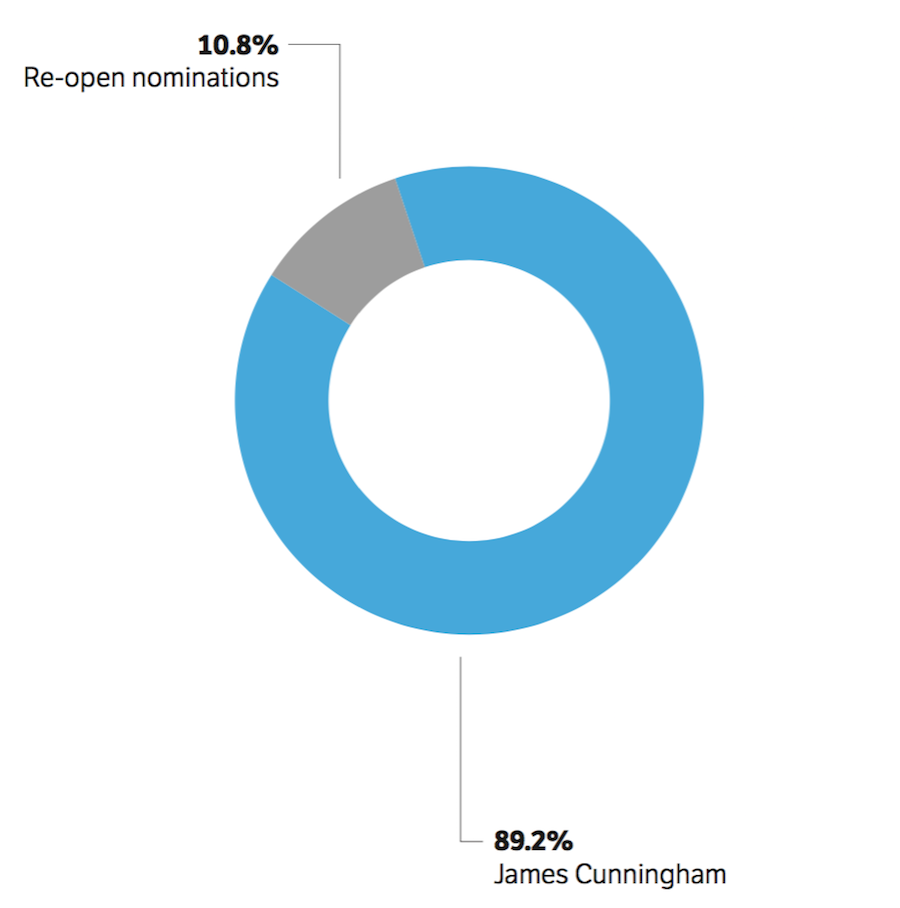
The poll conducted shows that Cunningham has one of the lowest percentage of unsure voters in this year’s elections, with just 34.2 per cent stating that they did not know whether they would vote for him over the next few days. This is second only to the Entertainments race, but is similar to that of Education – the only other uncontested race.
Such confidence in Cunningham is surprising as uncontested races have generally seen higher rates of re-open nominations votes or uncertainty. This is particularly unexpected in the welfare race, which has been heavily contested in the last few years of elections. Five candidates competed for the role last year, for instance.
Despite somewhat strong performances at hustings, facing few trying questions over the last week and campaigning off campus, Cunningham polled best in the Arts Block, with just 10.3 per cent of AHSS students voting against him. However, his campaign in Trinity Hall was clearly successful, with 91.4 per cent of first-year students voting in his favour. As one of the few candidates to venture to Trinity Hall on the first day of campaigning, Cunningham is a prime example of the importance of garnering the vote of such residents. His case to students and ability to win over the first-year vote was no doubt bolstered by his experience on the JCR. Cunningham was Welfare Officer of the JCR last year.
Perhaps worryingly, Cunningham’s lowest approval rating comes from his own year and the year that would have lived in Halls during his time as JCR Welfare Officer. His experience in this position has been a key part of his campaign, but the 12.5 re-open nominations vote suggests that he failed to win over those that spent time with him in charge of welfare. It is important to note that while this is higher than other years, it is still a relatively small proportion of votes and should not threaten his chances.
Cunningham received the highest percentage of re-open nominations votes from EMS students of any race this year, with just over one in eight students from the east end of campus voting to re-run the race with different candidates. This proportion of students from an already disenfranchised section of campus voting against him suggests that it will be a difficult task for Cunningham to bridge the gap between House Six and the Hamilton during his tenure as welfare officer.
The University Times has accurately predicted the outcomes of most of the TCDSU Election races for the last four years. The results modelled for this poll exclude undecided voters and simulate transfers as they will be carried out on count night. The results of this year’s elections will be counted, alongside the results of the preferendum on supplemental fees and modular billing, this Thursday night, after four days of voting.
Communications & Marketing
The race this year marks a significant change from that of last year, which was uncontested. Yet, in a competitive race defined by contrasting candidates, it seems fourth-year drama and theatre studies student Paraic McLean is most likely to be elected.
McLean Leads After the First Count
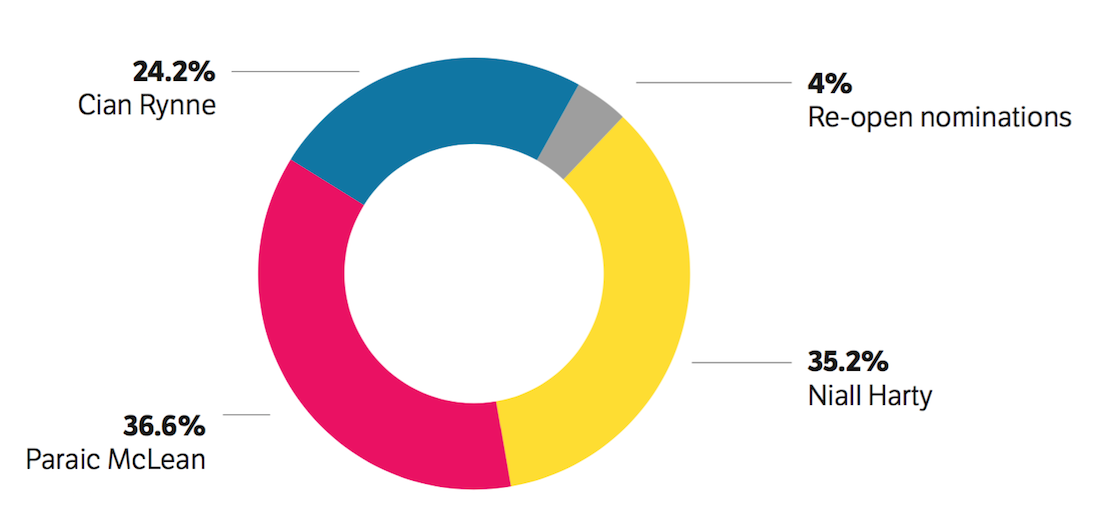
Our polling predicts that McLean will be elected after the third count, defeating Niall Harty, who has run on an anti-establishment platform of “don’t back a hack”. Our poll revealed that McLean will receive 36.6 per cent of first preferences, while Harty will receive 35.2 per cent of first preferences. Cian Rynne, the third candidate in the race, will be eliminated in the second round, with his votes transferring evenly between McLean and Harty.
The race has been one of the more divisive of the TCDSU election season. Rynne, known for his Trinity College Doggos Facebook page, has best embodied the anti-union sentiments Harty has tried to represent in impressive and persuasive performances in hustings after hustings. However, perhaps in part because Rynne has had a lacklustre on-the-ground presence, voters have flocked to Harty and his large campaign.
Third and Final Count
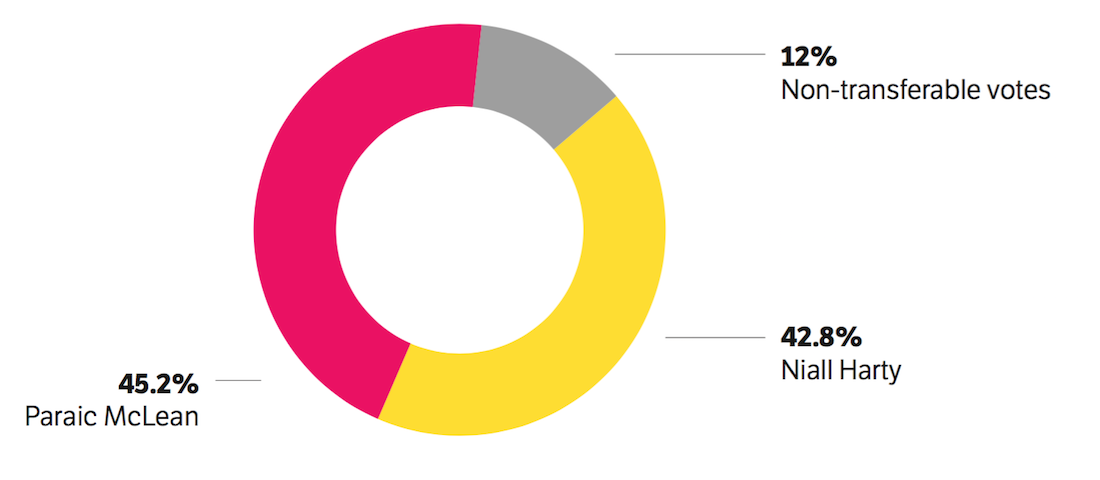
First years seem to favour McLean, with 40 per cent backing him over Harty and Rynne. Rynne, whose Facebook page is hugely popular, dominated second-year students, with 37.5 per cent of this cohort backing him. However, older students appear less fond of Rynne, with third and fourth years giving him 17 per cent and 19.3 per of their first-preference votes respectively.
By comparison, McLean will take 42 per cent of third years’ first preferences. Yet Harty, a fourth-year philosophy student, sweeps up the vote among fourth years, with a 43 per cent share.
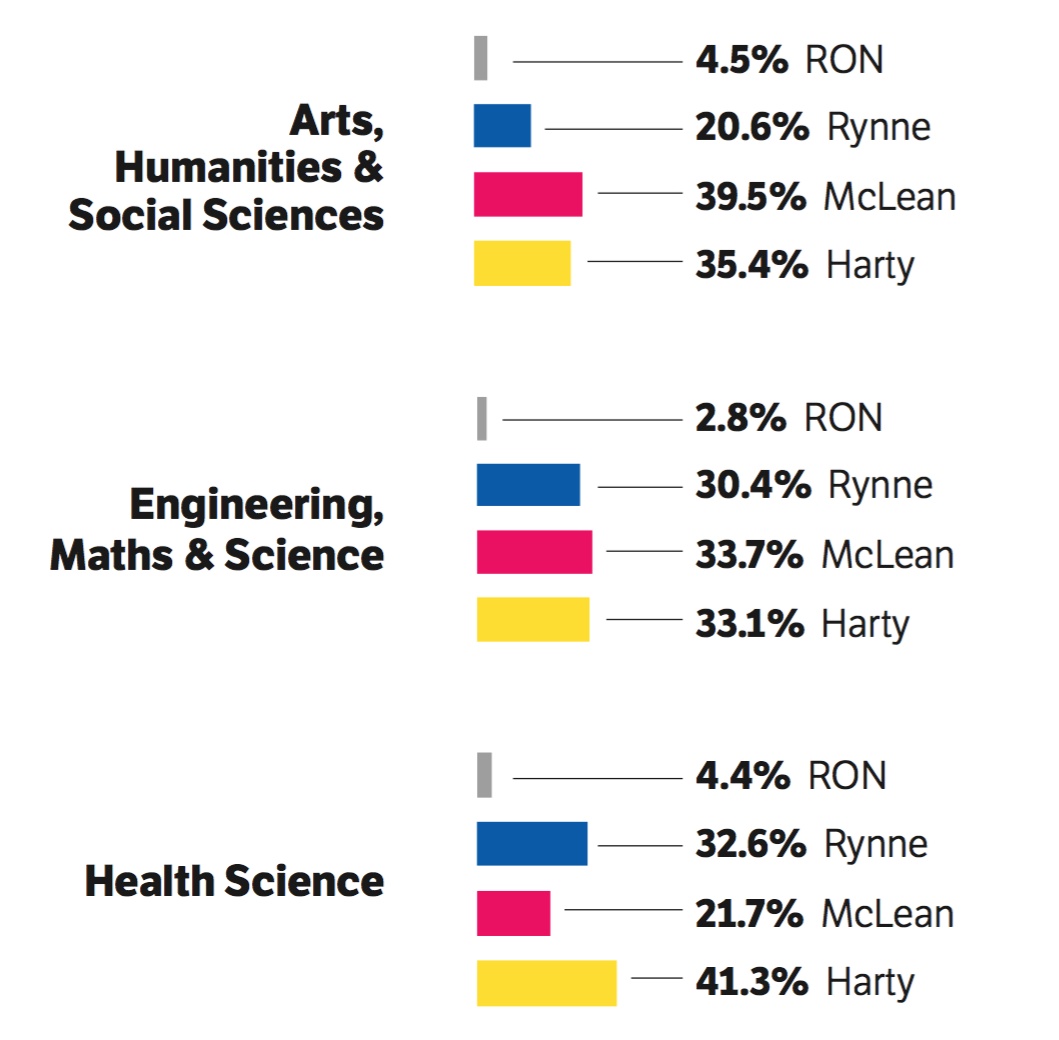
McLean and Harty are both arts students. Though McLean is the TCDSU Convenor for Creative Arts, it’s unsurprising both candidates do well in the faculty. With both on an almost-equal footing with students from the AHSS faculty, it captures something of a divide among arts students – with some favouring McClean, who has pitched himself as the candidate with union experience, compared to Harty, who has stressed his private sector experience.
McLean edges ahead among arts students by 4.1 percentage points, with 39.5 per cent of the vote. McLean is also dominant among students from the Faculty of Engineering, Maths and Science (EMS), albeit by only 0.4 per cent, with Harty at 33.1 per cent.
However, according to our poll, almost twice as many students from the Faculty of Health Science (HS) will give their first preference to Harty, closing the gap. Rynne, who was a qualified third in the other two faculties, splits the difference between McLean and Harty among health science students, securing 32.6 per cent of their first-preference votes.
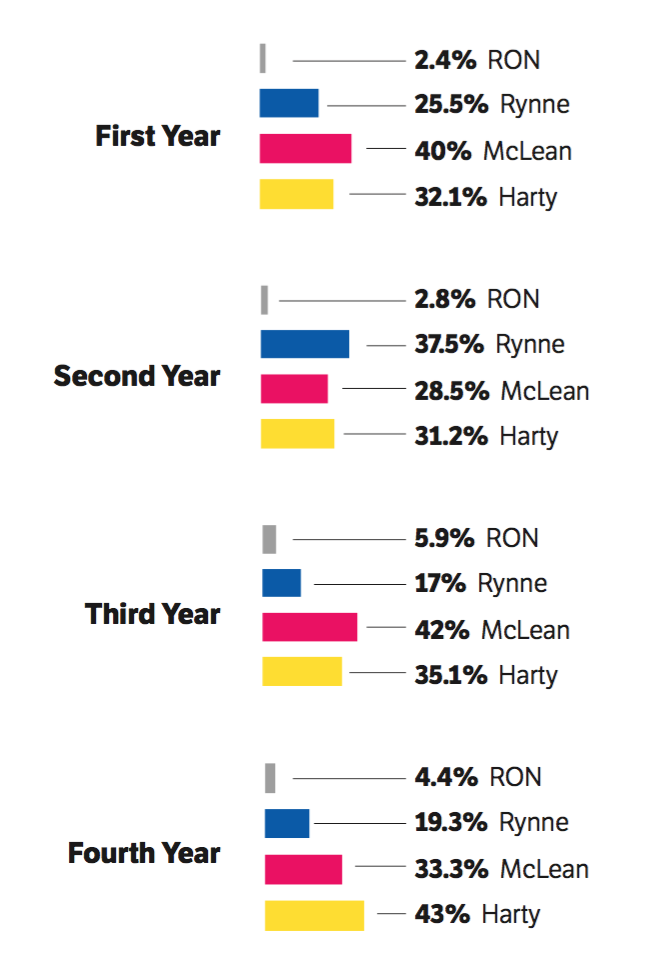
While the race will be tight, we expect McLean to emerge as a winner. However, the close-run nature of the race is a testament to the strong Harty campaign, which seems to be attracting voters with an attitude of ambivalence towards TCDSU and a promise to engage more students in the union.
Indeed, this is the closest communications and marketing race in recent memory. Last year, Úna Harty received 90 per cent of the vote in an uncontested race, while her predecessor Glen Byrne was elected on the first count, with 54.2 per cent of the vote, in 2016. In 2015, the first-ever Communications and Marketing Officer, Aifric Ní Chríodáin, was elected with 61.3 per cent of the vote.
While those polled consistently lined up behind Harty and McLean, there were a significant number of people who were uncertain, at 28 per cent.
Entertainments
Based on the data collected, David Flood is likely to be elected in the first round over rival Matt Dundon, with Flood likely to receive 70.1 per cent of first preferences. Dundon polled just 28.7 per cent of first preferences. Only 1.3 per cent of those who voted chose to re-open nominations.
Flood’s Landslide Vote
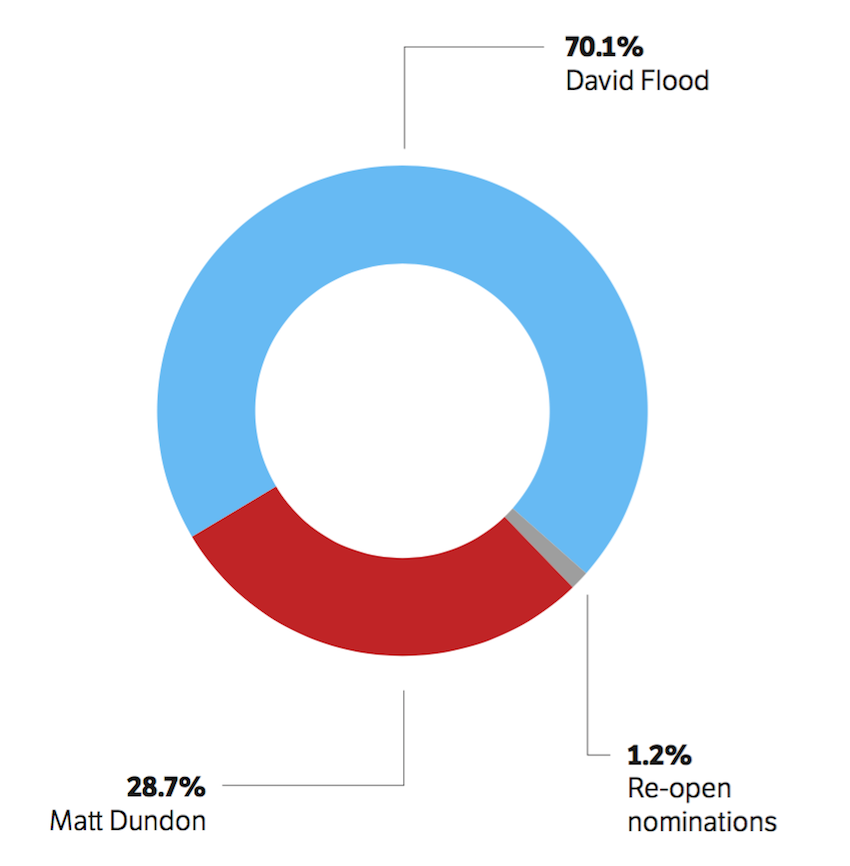
For Dundon, a third-year student of philosophy, political science, economics and sociology, the polls will be a crushing blow, after a week of hustings at which both candidates performed well, offering their differing ideas for the role. Dundon’s continued emphasis during hustings on the importance of a realistic approach to the job was in marked contrast to Flood’s big ideas, such as crowdsourcing the lineup for Trinity Ball, and it appears that the latter’s idealism has struck a chord with voters.
With the success of Flood’s first campaign night last Thursday – at which the only sticking point was the lack of wheelchair access, something he explained was unavoidable due to budgetary constraints – it seems that his inclusive approach to the position, with ideas extending beyond the well-worn campaign cornerstone of nights out, has resonated with voters. His second campaign night, adopting the theme of Noah’s Ark, takes place tonight in the Wiley Fox.
Dundon, on the other hand, has looked again and again to highlight his experience as the organiser of the successful Midnight Disco. It took pride of place on his manifesto, and it was a theme to which he returned ad nauseam throughout hustings last week. However, it appears that, in constructing a campaign around the more conventional theme of nights out, Dundon has fundamentally misread the desires of students.
Flood’s lead stretches across every year and faculty, offering little hope of a comeback to Dundon. In no faculty does Flood hold less than less than 60 per cent of the vote, and among EMS students, his own faculty, the poll places him on 76.9 per cent of the vote. Dundon’s highest vote share is 37 per cent, among health science students, and among AHSS students, a faculty he will surely have been targeting given Flood’s course of study, he is polling at just 30.6 per cent of the vote.
Dundon will hope that his two upcoming campaign nights may swing the race back in his direction. However, even with a strong track record of hosting successful club nights, the gap looks far too large for Dundon to bridge, particularly given that he is banned from social media campaigning between 9am and 9pm today, after breaching the rules of the union’s Electoral Commission (EC) on Friday.
Dundon made perhaps the stronger start to his campaign, dominating TCDSU council hustings on an evening when Flood’s pre-rehearsed speech failed to excite the crowd. However, he clearly learned important lessons from this experience, and the equality and activism hustings were far more even, with both candidates making good points and proposing interesting ideas. Dundon, however, the more brash of the candidates, may have actually lost out based on his tendency to disagree with Flood’s points. In seeking to position himself as the authority on ents, he perhaps failed to realise that the amiable nature of Flood’s campaign was helping him race ahead.
However, it is possible to overstate the significance of hustings to a campaign, and on social media, Flood’s video content has eclipsed Dundon’s, in volume at least, with his “3@3” video series, in which he has offered facts about his campaign, being watched hundreds of times. In contrast, Dundon’s more text-heavy social media campaign, while more polished than Flood’s, has possibly failed to capture imaginations.
Editor of The University Times
In the first year that the race has been contested, Eleanor O’Mahony is likely to be elected Editor of The University Times in the first round, earning 63.7 per cent of first preferences. McDermott polled 34.2 per cent of first preferences, with re-open nominations receiving just 2.1 per cent.
Surprise in First Contested Race
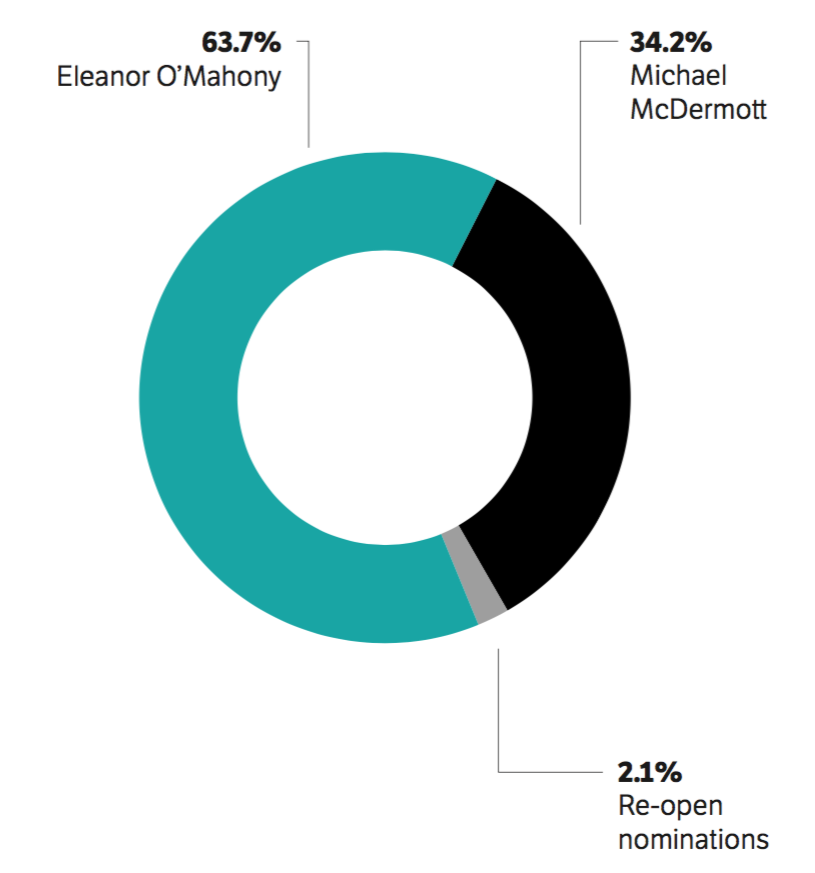
Polling between 61.9 per cent and 72.2 per cent across first, second and fourth years, O’Mahony has pulled far in front of joke candidate McDermott among these voters. However, among third-year voters the poll is far more split. O’Mahony is set to gain 54.5 per cent, but McDermott will collect 43.3 per cent of these group.
O’Mahony performed the worst among EMS students, though is still well ahead of McDermott at 62.8 per cent. McDermott is likely to see 35.3 per cent of the EMS vote. In her own faculty, O’Mahony is likely to receive 64.5 per cent of the vote, with McDermott likely to receive 34.1 per cent.
This year the overall re-open nomination vote is 2.1 per cent, markedly lower than the previous three years for the Editor race, which has been uncontested since the role was formally split from that of the union’s Communication Officer. Last year, re-open nominations polled at 8.8 per cent. The year before, 2016, re-open nominations looked set to gain 8.7 per cent of first preferences. It is clear that McDermott is attracting some of the voters that might traditionally have chosen to re-open nominations.
However, McDermott has not openly contested the Editor race in any tangible way, preferring to concentrate on his presidential bid. O’Mahony had a shaky start to hustings last week, but the sit-down Q&A style of Wednesday and Thursday night’s hustings suited her better. Nevertheless, O’Mahony has not had a large or strong on-the-ground campaign this week. So McDermott’s likely gain of 34.2 per cent of first preferences may come as an embarrassment to O’Mahony, as on count night Editor candidates are typically elected with an average of 86 per cent of votes.
Preferendum
Polling by The University Times of over 1,000 students shows a split among students’ attitudes ahead of a preferendum on the introduction of supplemental exam fees.
No Clear Preference
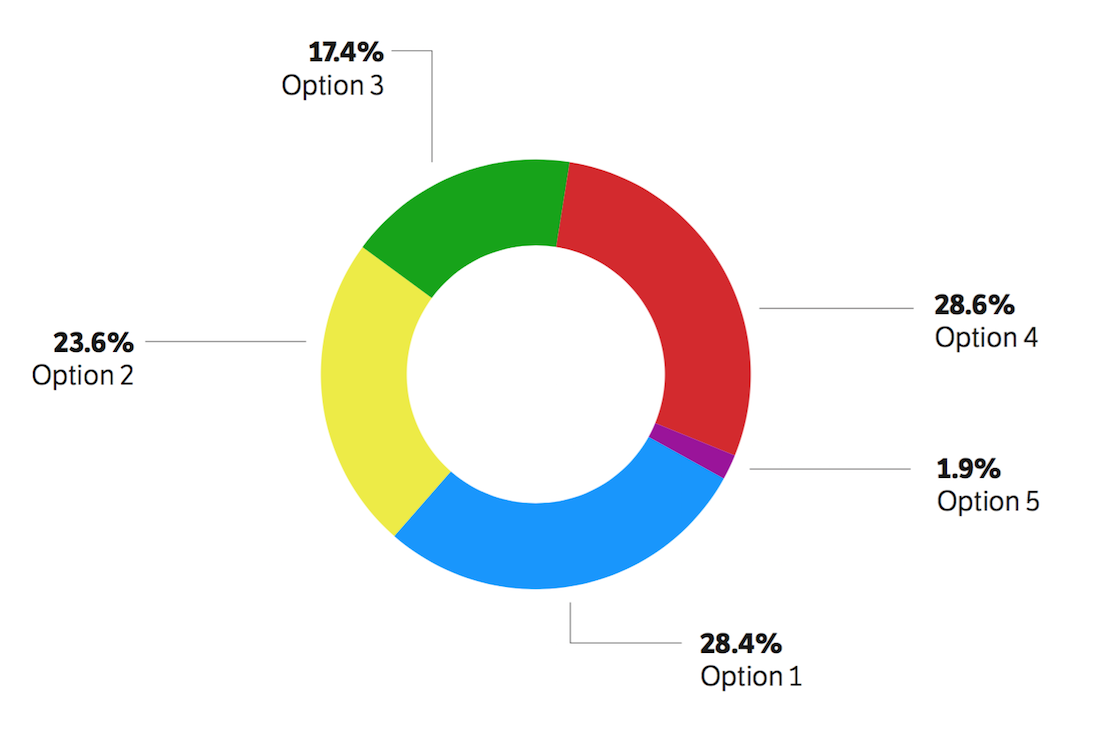
After a vote to hold a preferendum on the issue at Trinity College Dublin Student’s Union (TCDSU) council last month, polling conducted this week shows that option one and option four – two options in almost diametric opposition to one another – are the two most popular.
Option one, which states that the union should “support the introduction of supplemental exam fees, providing that modular billing and a cap are introduced”, is currently only slightly less popular than option four, which states that “TCDSU [should] oppose both the introduction of supplemental exam fees and of modular billing”. The two options are currently at 28.4 per cent and 28.6 per cent respectively of the vote share.
With 66.4 per cent of students stating that they did not feel TCDSU had provided enough information about the different options, and several options which are almost intractable, it is perhaps unsurprising that there is such a strange divide in vote share.
However, what is surprising is the fact that the seemingly common-sense option three is lagging behind in the polls. Option three, which states that TCDSU “should not support the introduction of supplemental fees but should advocate for modular billing” was chosen by just 17.4 per cent of students. Modular billing would mean that students forced to repeat a year after failing a module would only have to pay for that module, rather paying fees for the entire year.
It is strange, too, that the issues of supplemental fees and modular billing, which are not linked in and of themselves, have been bound together in this referendum. Option two – “TCDSU should not support the introduction of supplemental exam fees, regardless of a cap or the introduction of modular billing” – and option four are particularly difficult to differentiate, divided as they are on the issue of modular billing.
Option one, which proposes that “TCDSU adopt a stance to support the introduction of supplemental fees”, was, predictably enough, the least popular option.
For TCDSU, such a stark divide in students’ attitudes will make for grim reading. If our poll is accurate, then the union will have to try and walk the tightrope between the two viewpoints, attempting to represent a divided student population in the face of a College seemingly intent on introducing supplemental fees.
Dominic McGrath and Donal MacNamee also contributed reporting to this piece.
Daniel O’Reilly conducted data analysis, cross tabulation and modelling.
Alanna MacNamee, Malachi Ó Marcaigh, Aaron Finnegan, Aoife Kearins, Joe Dudley, Kathleen McNamee, Cormac Watson, Ivan Rakhmanin, Tommy Halpin-Kelly, Isla Hoe, Ciaran Molloy, Blaithín Wilson, Sophie Andrews-McCarroll, Jack Synnott, Matthew Murphy, Louise McCormack, Aisling Marren, Clare Healy and Jake Gilchrist conducted polling.
